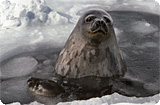séminaire – mardi 27 mars 2012
 Host-parasite interactions as indicator of human impacts in Australian and Antarctic environments
Host-parasite interactions as indicator of human impacts in Australian and Antarctic environments
Michelle Power, Macquarie University, Sydney
mardi 27 mars 2012 à 11 heures, amphithéâtre Monge
In todays changing world the impacts of global change on host-parasite interactions are significant. Changes in host-parasite interactions are particularly evident at the interface between humans, domestic animals and wildlife, where the risk of disease emergence is high. By characterizing these interactions at this interface, or within environments where human perturbation is high, we are placed in a better position to mitigate these impacts. Using genetic approaches to characterize parasites and bacteria of hosts inhabiting threatened ecosystems of Australia and Antarctica are providing information on human impacts and the risk of disease emergence in these environments. The findings of microbial/parasite characterization of threatened marsupials and marine mammals, and parasites of alpine grasshoppers, will be presented.
- extrait:
- lien_externe:
- titre:
- Host-parasite interactions as indicator of human impacts in Australian and Antarctic environments
- intervenant:
- Michelle Power
- date:
- mardi 27 mars 2012
- kc_data:
- a:8:{i:0;s:0:"";s:4:"mode";s:0:"";s:3:"css";s:0:"";s:9:"max_width";s:0:"";s:7:"classes";s:0:"";s:9:"thumbnail";s:0:"";s:9:"collapsed";s:0:"";s:9:"optimized";s:0:"";}
- kc_raw_content:
 Host-parasite interactions as indicator of human impacts in Australian and Antarctic environments
Host-parasite interactions as indicator of human impacts in Australian and Antarctic environmentsMichelle Power, Macquarie University, Sydney
mardi 27 mars 2012 à 11 heures, amphithéâtre Monge
In todays changing world the impacts of global change on host-parasite interactions are significant. Changes in host-parasite interactions are particularly evident at the interface between humans, domestic animals and wildlife, where the risk of disease emergence is high. By characterizing these interactions at this interface, or within environments where human perturbation is high, we are placed in a better position to mitigate these impacts. Using genetic approaches to characterize parasites and bacteria of hosts inhabiting threatened ecosystems of Australia and Antarctica are providing information on human impacts and the risk of disease emergence in these environments. The findings of microbial/parasite characterization of threatened marsupials and marine mammals, and parasites of alpine grasshoppers, will be presented.
